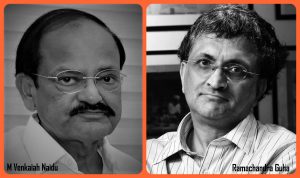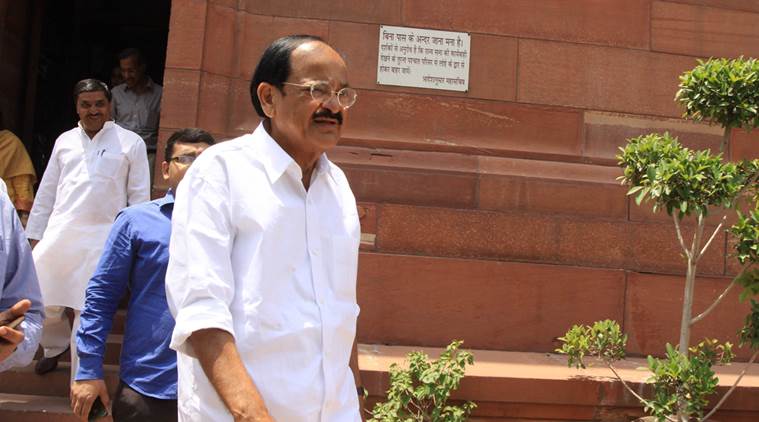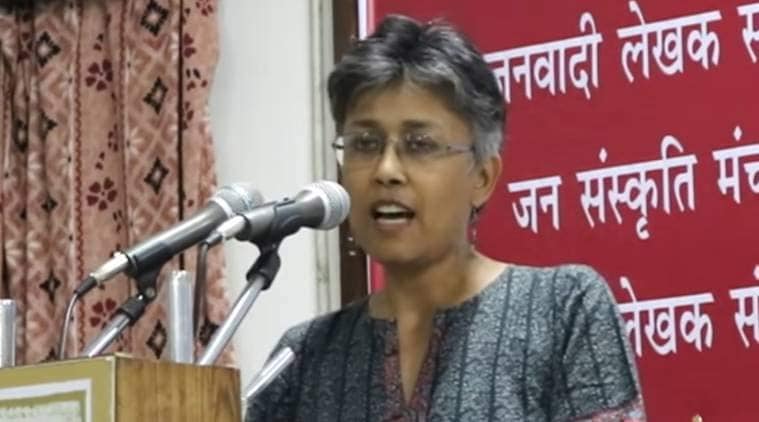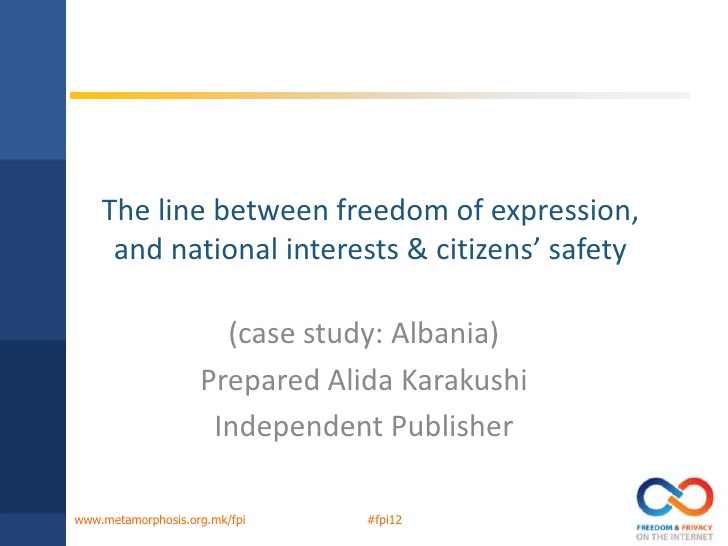 Ramachandra Guha speaks on one-day ban on NDTV India imposed by the government of India and Chhattisgarh police booking case against DU Professor Nandini Sundar as how it will dent freedom of speech in their country. On the other hand Union Minister M Venkaiah Naidu stressed on media, to disseminate news, while “keeping in mind the interests of society and nation first”
Ramachandra Guha speaks on one-day ban on NDTV India imposed by the government of India and Chhattisgarh police booking case against DU Professor Nandini Sundar as how it will dent freedom of speech in their country. On the other hand Union Minister M Venkaiah Naidu stressed on media, to disseminate news, while “keeping in mind the interests of society and nation first”
[/vc_wp_text]
Press freedom yes, but nation’s interests first, says Venkaiah Naidu
His remarks come in the wake of criticism over his ministry’s decision to take NDTV India off air for 24 hours on November 9
 Union Minister M Venkaiah Naidu. (PTI File Photo)
Union Minister M Venkaiah Naidu. (PTI File Photo)
Union Information and Broadcasting Minister M Venkaiah Naidu Sunday said the government is committed to the freedom of press but the media, while disseminating news, should “keep in mind interests of society and nation first”.
His remarks come in the wake of criticism over his ministry’s decision to take NDTV India off air for 24 hours on November 9 for allegedly revealing “strategically sensitive information” during the course of its coverage of anti-terror operations at the Pathankot airbase earlier this year.
WATCH VIDEO: One-Day
One-Day Ban On NDTV India Put On Hold: Find Out More
“Journalists are also citizens. They should remember freedom of expression is best utilised only when the value of such freedom is fully appreciated. When this freedom is not exercised judiciously, our existing laws provide for necessary interventions. We are not thinking of any new restrictions on any media. But the government expects all stakeholders to be responsible in using different platforms,’’ he said.
“When broadcasting news, keep in mind interests of society and nation first. The news you are disseminating should not promote clashes between groups, religions or create unrest in society. The news should not cause harm to the nation’s interests. There should be self-restraint,’’ he said.
He said information with confirmation is the “best ammunition”. “Information can fight corruption, inequality, discrimination, oppression. Information can give you entitlement. Through information, people will be empowered,” he said.
“First give the news and then have the debate. But what is happening is even TV debates try to mix both the things and then they argue and try to teach us also,” he said. “News should be news, views should be separate. Of late, this tendency of combining news with views is creating distortion.”
Underlining the importance of media credibility, Naidu said: “The important thing in media is credibility. Credibility is very important but is now missing in most of the media today, which is unfortunate. We must always work for credibility.”
“Be nearer to truth and keep away from sensationalism. But what is happening in the electronic media is sensationalism,” he said.
Stating that there are some regulations that media should not breach — something which is anti-national; not propagate against the interest of the country aspects like obscenity, vulgarity and encouraging violence. He said the electronic media and cinema should seriously think how to avoid vulgarity, obscenity and violence.
On social media, Naidu said: “Social media is spontaneous and interactive. Such a medium is both an opportunity and a challenge. We believe people will take advantage of social media, expect them to make judicious use of it in the larger national and individual good. Self-regulation of the content by media is the best way to control violation of socio-cultural and national values and ethos.”
Calling for greater promotion of Urdu and regional languages, he said: “Urdu is a sweet language and it has also enriched Indian culture over the centuries. But unfortunately, some people have linked it with religion in between. Time has come. We have to encourage our regional languages… as a language, Urdu should also be encouraged.”
He said plans were afoot to increase the time of Urdu bulletin aired on Doordarshan.— With PTI
[/vc_wp_text][vc_wp_text title=”Ramachandra Guha”]
Republic of Unfreedom
NDTV and Bastar incidents display the undemocratic instincts of India’s politicians and public officials.
 DU Professor Nandini Sundar. (Source: YouTube screen grab)
DU Professor Nandini Sundar. (Source: YouTube screen grab)
This has been a bad month for Indian democracy. First, there was the one-day ban on NDTV India imposed by the government of India. This sparked much protest; bowing to the pressure, the government seems to have stayed the ban — whether for the moment or for ever, it is not clear. Just when Indian democrats began to breathe easier, however, news came that the Chhattisgarh police had booked a group of writers and activists for murder, among them India’s finest anthropologist, Nandini Sundar, a respected professor at Delhi University with a wide and deserved international reputation.
Freedom of expression has long been in peril in our country. Writers have had their books banned, artists their exhibitions vandalised, film-makers their films censored. But what happened recently in Chhattisgarh marks a new low. The group, of which Sundar was a part, had visited the strife-torn region of Bastar, and prepared a report on the deteriorating human rights situation in the state. This was their real crime, that so enraged the Chhattisgarh police that they filed a charge of murder!
Bastar is a part of India that has long interested me. I wrote a biography of Verrier Elwin, the great chronicler of Adivasi life and culture, who did his best work in Bastar. Elwin argued passionately in defence of tribal rights in land and forests. He hoped that Independent India would respect and protect tribal rights; instead, successive governments have treated them with contempt and condescension. The expropriation of tribal lands and forests has led to deep discontent, adroitly exploited by the Maoists, who in recent decades have made major strides in Adivasi areas, not least in Bastar.
A democratic state should have fought Maoism by redressing the many wrongs it had committed against the tribals. Instead, the Chhattisgarh government promoted a vigilante army named Salwa Judum, provoking a savage war, in which the violence of the Maoist was met by the equally brutal violence of the state-sponsored Judum. The tribals were caught in between, vilified by one side and victimised by the other. In this ongoing civil war, dozens of villages have been burnt, hundreds of Adivasis killed, and close to a hundred thousand people displaced.
In 2006, a group of independent citizens, which included Sundar and myself, visited Bastar. Afterwards, we filed a public interest litigation in the Supreme Court. In its judgement of July 2011, the court ordered the disbandment of Salwa Judum. The Supreme Court said it was “aghast at the blindness to constitutional limitations of the state of Chhattisgarh, and some of its advocates, in claiming that anyone who questions the inhumanity that is rampant in many parts of that state ought necessarily to be treated as Maoists, or their sympathisers, and yet in the same breath also claim that it needs the. sanction, under our Constitution, to perpetrate its policies of ruthless violence.” Judges Sudarshan Reddy and S.S. Nijjar remarked that “lawless violence, in response to violence by the Maoist/Naxalite insurgency, has not, and will not, solve the problems, and instead it will only perpetuate the cycles of more violence”.
Sadly, while the Supreme Court can pass strictures it cannot ensure that its orders are followed on the ground. The brutal, barbaric civil war in Bastar continues. The Maoists fetishise and glorify violence, which is why this writer detests them. Tragically, a government sworn to uphold the Constitution has emulated the Maoists in showing an utter contempt for the rule of law and for basic democratic values. Bastar is a war zone, where ordinary citizens fear not just the Maoists but the Chhattisgarh police as well.
Chhattisgarh has had a series of freedom-hating police officers, each more vicious and vindictive than the last. The inspector general now in charge of Bastar was reported by The Hindu as saying, “We don’t need any interference or guidance, Bastar knows to handle its own problems. We don’t like any kind of interference”. In pursuance of this policy, the Chhattisgarh police have arrested several journalists on trumped-up charges, and hounded several others out of the region. Most recently, they have filed this FIR charging Sundar and several of her colleagues with murder. I have read the FIR, whose wording and precise recollection of names of people the witness had never met, make it clear that it was doctored and/or coerced.
The timing of this attack on one of India’s most admired scholars (a winner of the Infosys Prize) may not be accidental. Last month, Sundar published The Burning Forest, a deeply moving and richly researched book on the civil war in Bastar. This book, which by no means exonerates the Maoists, shines a sharp spotlight on the errors and crimes of the Chhattisgarh state government, its consistent and sometimes gross violations of the law, its utter contempt for the Constitution and for the Supreme Court. The FIR initiated by the police is a malicious act of revenge.
This act by a rogue police force brings shame on Indian democracy. As I write, the state and Central governments have stayed silent. Do they condone it? One hopes not. For foisting false murder charges on independent (and utterly non-violent) citizens is characteristic of police states like Putin’s Russia or Xi Jinping’s China. I do not credit the Chhattisgarh government with a deep understanding of democratic principles. But surely some ministers in the Central government must understand the damage such arbitrary and vengeful behaviour does to the image of their party, the Union government, and the nation itself.
NDTV India is a prominent channel based in New Delhi. Professor Sundar has a high international standing. If they can be subject to such treatment, one shudders to think of the fate of writers, journalists, scholars and artists who work away from the glare of the national media. And of the fate of ordinary citizens too. Physical attacks on journalists in remote parts of India, often encouraged by the state and/or powerful politicians, are now increasingly common. The everyday harassment, by the police and paramilitary, of ordinary citizens in conflict-zones such as Bastar, Kashmir and Manipur is very nearly ubiquitous.
I have increasingly come to think of India as an “elections-only democracy”. Elections are free and fair; but once a party (any party) wins power, it considers itself immune from criticism or fair appraisal for the next five years. The NDTV and Bastar incidents display afresh how profoundly undemocratic are the instincts of Indian politicians and public officials.
[/vc_wp_text]














